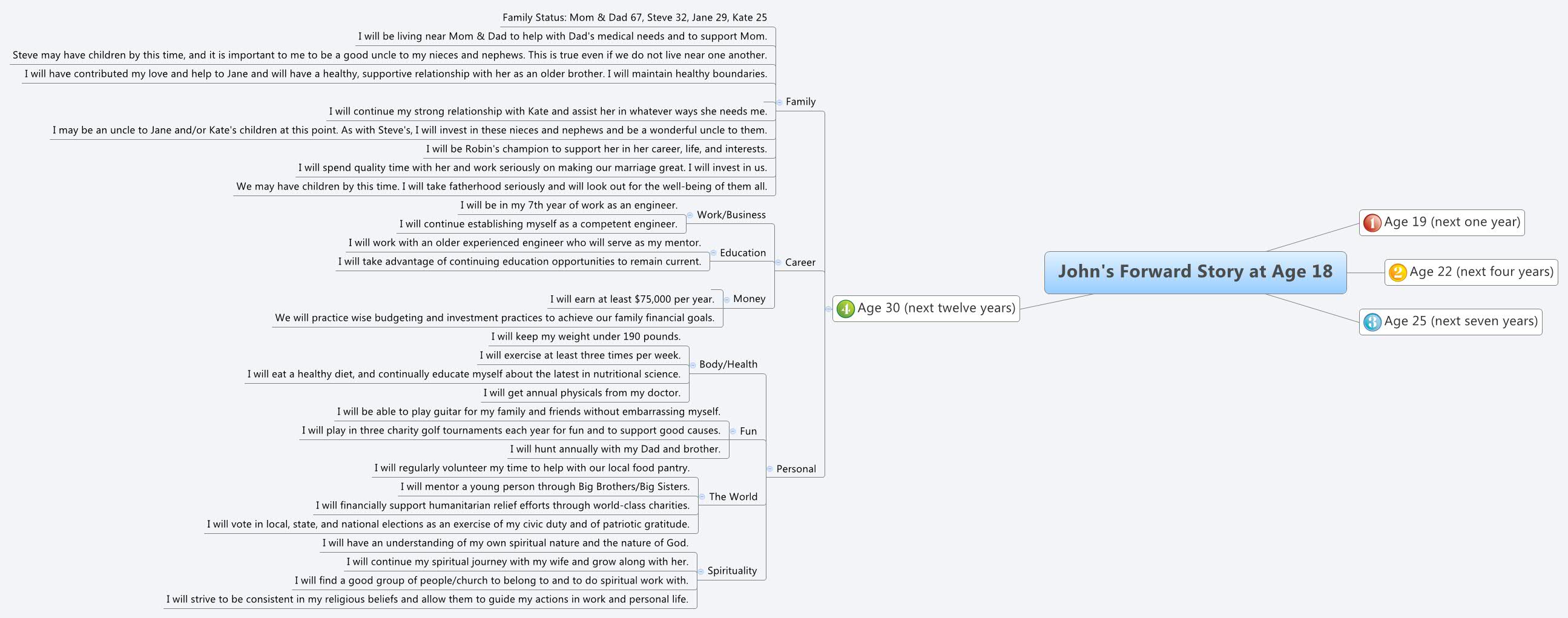In our last article we added the family realm to John’s mind map in order to help him write his Forward Story. John chose to start with his family because he sincerely values his parents, siblings, and future spouse, and wants the rest of his life and plans to revolve around the obligation he feels toward them. This is really a matter of personal choice and priority. If John had a different family situation or a different commitment toward his family, he might not start with that realm. An important point to understand is that if John had not begun with family first, his mind map (and his resulting Forward Story) would likely be quite different. You must decide where to begin your thinking and planning. It will depend on what is most important to you. It will relate to your ambition.
As a reminder, here is the age 30 mind map John developed for his family priorities. (All images will enlarge when clicked).

The Career Realm
The question for John now is what kind of education, work, business, and money will he need by age 30 in order to fulfill his desires for his family? For convenience’ sake we are going to lump all of these areas into a category we call Career. Remember that John is 18 years old. He has just completed high school, and truly stands at a threshold. A big reason he is creating his Forward Story now is because he knows that his next moves will be critical to the kind of future he will have. In order to fulfill his 12 year plans for his family, John will need to be living near his parents when he is 30 or perhaps have enough financial resources to move them near him (if his father’s health really declines) or to be able to care for them from a distance. This all requires financial resources. In other words, he will need to have a job in his hometown or be making a lot of cash elsewhere.

What Does John Want to Be When He Grows Up?
There are scores of books dedicated to the subject of career choice and vocation. There are professionals who have built successful careers themselves based on helping guide people to a good career choice. What John is about to decide and write about his career is going to have sweeping implications for him. The huge question he must answer is: “What kind of career or job do I want to have?”
It is important that we not pass over this too quickly. For John this may well involve a lot of soul-searching, research, conversations with other people, and quite honestly, stress. It seems a little strange that people as young as 18 often must decide something so serious at such a young age. However, many of the more financially rewarding career tracks will require specialized education and training that John must start right away if he wants to pursue them.
A Cold Hard Economic Reality
This seems like a good place to state an obvious economic fact. The more specialized and rare a skill set you possess, the more income you can earn. The less specialized and more common a skill set you possess, the less income you can earn. For example, a lot of people can use a shovel to dig a trench. It is not that hard to learn how to do it. Because of this, trench diggers cannot earn much over minimum wage to do this job. There is a lot of competition from people who can do that. On the other hand, not very many people have the education, training, and skill to do a heart transplant. If you can successfully do heart transplants, you are going to make a lot of money. The tough part of this is that it takes a lot more time and work to become a heart transplant surgeon than it does to become a trench digger. It is not that digging trenches is not important. It is also not that there is no dignity in hard physical labor. There can be. It is just that in the law of supply and demand, there is a lot more supply of trench diggers than there are people needing trenches dug. Conversely, there are a lot more people needing heart transplants than there are heart transplant surgeons. This drives the cost up.
Given the economic facts of supply and demand, John decides that he wants to earn far more than minimum wage. He wants to get some skills and education that will enable him to earn a good income to be able to achieve his family goals. He begins to research various careers, the education required, the projections for how those careers will be needed in the future, and how much people in those careers earn. This is not a neat and tidy process for John or anyone else. It is a struggle for most people. There are a rare few that seem to know from an early age exactly what they want to do and then do it. For the rest of us, we wrestle, struggle, and come to a decision.
John’s Decision
After much time and effort, John decides that he would like to go into engineering. He is not yet sure what type of engineering he wants to study, but is content that he will figure that out once he gets to college. For now he can envision earning a good living as an engineer. The city where he grew up and where his parents live has a strong job market for engineers, so he thinks this is compatible with his family goals. With that direction set, John can proceed with his Career realm on the mind map. His 30 year-old Career realm includes:
- I will be in my 7th year of work as an engineer.
- I will continue establishing myself as a competent engineer.
- I will work with an older experienced engineer who will serve as my mentor.
- I will take advantage of continuing education opportunities to remain current.
- I will earn at least $75,000 per year.
- We will practice wise budgeting and investment practices to achieve our family financial goals.
Here it is in his mind map:

Please notice that John has not yet dealt with the intervening years between his current age of 18 and his age 30 plans. That is for another step. What John has written and planned so far in regard to his life at age 30 has implied certain things about the years between those two ages, but he has not explicitly dealt with it yet.
John might have chosen any number of careers, some of which would not require college or trade school. Had he chosen a different career track, the years leading up to age 30 would look different and his earning potential might be different. The critical thing to realize, however, is that John has the right and the responsibility to choose. In our next article John is going to fill out the Personal realm in his age 30 plan.
What resources have you found helpful in the areas of career choice, salary information, and personal money management?
















